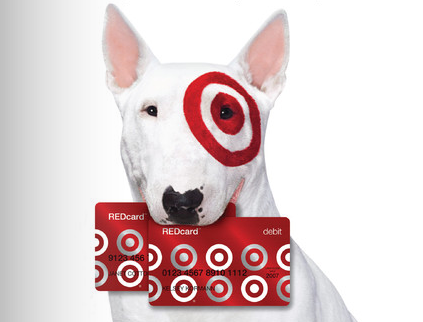Save Money
The Target Red Card Decision
 Lately I’ve been thinking about getting the Target Red card. (Note that this post is strictly about the debit card. Target also offers a credit card which offers similar benefits to the debit card, but also acts like a credit card in that you are charged interest on unpaid balances.) I became interested in this card especially after we terminated our membership to the local warehouse club. I was curious to see if the main perk, a 5% discount on purchases at Target, would enable us to save more money, but without having to pay to shop somewhere.
Lately I’ve been thinking about getting the Target Red card. (Note that this post is strictly about the debit card. Target also offers a credit card which offers similar benefits to the debit card, but also acts like a credit card in that you are charged interest on unpaid balances.) I became interested in this card especially after we terminated our membership to the local warehouse club. I was curious to see if the main perk, a 5% discount on purchases at Target, would enable us to save more money, but without having to pay to shop somewhere.
Since I never do anything financial without doing a lot of research, I spent some time looking into the pros and cons of this debit card. Rather than sign up blindly when the cashier begged me to at checkout, I took my time. Here are the things that I learned:
Pros
5% Discount: This is the big draw. When you use the debit card, you save 5% on almost everything at Target, including sale and clearance items. (There are a few exceptions, but not many.) The discount is immediate and applied at the register for each transaction. It does not come in the form of rewards to be cashed in later.
Uses a PIN system: The card requires a PIN for use, which makes it more secure than a signature-based card. If someone gets your card, they have to also know your PIN to use it.
Free shipping on Target.com: You get free shipping with no minimum at Target.com. If you want to shop online, this is the Target equivalent of Amazon Prime.
Targeted coupons: Target may send you coupons in the mail and they are likely to be for products you’ve bought in the past. Since they’re able to track your purchases through the Red card, they know what to send you.
Fraud protection: Since the card isn’t issued by Visa or Mastercard, I was worried about how much I would be liable for if my card was used fraudulently. Target’s protection is similar to that provided by the major institutions. You will be liable for no more than $50 if you notify them within four business days that your card has been compromised. If it’s been more than four days, you may be liable for up to $500.
No hard credit check: When you apply for the card, your credit history is not checked. This means no “ding” on your credit report that could affect your ability to get a car loan or mortgage.
Not a credit card: Since this is a debit card and not a credit card, you can’t get caught in the interest trap. It’s also good for someone who does not want another credit card on their credit report, or who may not be able to qualify for a credit card.
Charity: 1% of your purchase price goes to the school of your choice. It’s not much, but it’s something.
Pharmacy rewards: When you fill five prescriptions using the card, you get an additional 5% discount that can be stacked with the standard 5% debit card discount, giving you, in essence, a shopping trip with 10% off.
Cons
Purchase tracking: Once you’re using the card, Target will know everything you buy and when. How much this bothers you is a personal decision, but if you don’t like companies knowing your business and sharing it with others (see below), this card may not be for you.
Delayed transaction posting: Transactions do not post immediately. Unlike a bank-issued debit card, Red card transactions can take a few days to clear. This is a problem if you don’t religiously track your bank balance.
Must provide SSN to apply: This won’t bother some people, but even though this is not a credit card, you still must provide your Social Security Number when you apply. Giving this number to yet another entity means that you are just a little more vulnerable to identity fraud.
Another entity has access to your checking account: This is the con that I’m least thrilled about. I’m not crazy about giving anyone, least of all a corporation, access to my checking account. Yes, under normal circumstances it is not a problem, but if Target has a data breach it can become a big problem. It’s also one more way that errors can occur, meaning I’ll be out my money while things get sorted out.
No set spending limit: Since this is not a credit card, there’s no set spending limit. You would think that since it’s a debit card you’d be able to spend up to the amount you have in your checking account, but this is not the case. Since the card does not withdraw funds from your account immediately or have “real time” access to your bank balance as your standard debit card does, Target uses some unknown combination of your purchase history, card age, and other information to determine how much you may spend each day. This amount is different for everyone. Worse, if you call Target, they cannot tell you what your limit is. Large purchases may be turned away meaning no discount for you. It’s likely not a problem for run of the mill daily expenses, but if you want to buy a TV or some other big ticket item, it could be a problem. (Some people report being able to still get the discount by speaking with a manager, paying part of the price on the Red card and the balance with another form of payment, but this will likely depend on the store.)
Possible overdrafts: Since you won’t be turned away at the register for insufficient funds, it means it’s also very easy to overdraft your account if you do not keep careful tabs on your bank balance. Just because the card will let the transaction go through doesn’t mean you have the money to pay for it.
Cannot opt out from information sharing: Target shares your information in-house, with other financial institutions, with their affiliates, and with companies not affiliated with Target. In other words, they share with pretty much anyone. And you cannot opt out of any of it. Be prepared for an increase in junk mail, telemarketers, and credit card offers.
Easy to overspend because of the discount: You have to be disciplined enough to say, “Just because I’m getting a discount does not give me an excuse to buy things that aren’t on my list.” It’s just so easy and tempting to throw extra stuff into the cart because, “Hey, it’s discounted.”
May make you feel, “locked in” to Target: Having the debit card may encourage you to shop at Target, even when there are better deals out there. You have to be disciplined enough to continue to shop around for the best deal instead of just going for the easy discount, which might not be the best.
Both
Can only be used at Target: This is both a pro and a con. It’s a pro because it means that if someone gets hold of the card, they can’t use it at Apple or a bunch of gas stations. It’s a con because it’s one more thing in your wallet that you have to keep track of, but which has only a single use application.
So what is my decision? For now I’ve decided to table the issue. I haven’t completely ruled out getting a card in the future, but I am not thrilled with the privacy issues or linking my checking account to another entity. While I understand that my information is already “out there,” I have to decide if I want to willingly give it to yet another company. And, while I also understand that security breaches can happen anytime, to any institution, giving my checking information to Target just increases the chances of a breach affecting me. The more companies that have my information, the more vulnerable I become to attacks.
You can say that I’m paranoid, but I just don’t see a 5% discount as enough to make up for the privacy I’m giving up. Make no mistake, Target is making a lot more off of this deal that I ever would in 5% discounts. They will be selling my information all over the place, and using that information to make certain that I stay in their store and purchase even more products. That’s their right; everything they’re doing is legal. But that doesn’t mean I have to like it, or sign up for it.
That’s not to say that the debit card isn’t fine for some people. If you are comfortable with all the information sharing, it may be great for you. If you are spending thousands in Target every year, that 5% may make up for the privacy loss. If you have no issue with the cons I’ve listed, then by all means sign up. If I decided to sign up, though, I think I would do so only with a checking account that’s separate from my main account. That way, at least some of the cons listed above would be less of an issue. If there were an error, a hack, or fraudulent use of my card, only the money in my “Target” account would be gone, while the money I need for everyday expenses would still be safe.
The bottom line is that you should do the research on the card and understand exactly what you’re getting into when you sign up. Read the full card agreement before you say yes. Don’t just happily fork over your information when the cashiers hit you with the 5% offer at checkout. The cashiers are trained to hard sell that 5% discount. It’s the things they don’t tell you that you have to evaluate for yourself.
Read the full article here

-

 Side Hustles6 days ago
Side Hustles6 days ago5 Myths About Young Shoppers and How Retailers Can Reach Them
-

 Passive Income4 days ago
Passive Income4 days agoThe One Microsoft Design Tool Business Owners Shouldn’t Miss
-

 Investing6 days ago
Investing6 days agoU.K. stocks lower at close of trade; Investing.com United Kingdom 100 down 0.07% By Investing.com
-

 Investing6 days ago
Investing6 days agoWant Your Workers to Be More Productive? You Need a Better Way to Measure Their Contributions
-

 Side Hustles6 days ago
Side Hustles6 days agoTake Control of Your Projects for Life for Just $79.97
-

 Side Hustles2 days ago
Side Hustles2 days agoThe DOJ Reportedly Wants Google to Sell Its Chrome Browser
-

 Side Hustles5 days ago
Side Hustles5 days agoHoliday Savings: Get a MacBook Air for $250
-

 Investing3 days ago
Investing3 days agoThis Founder Turned a Hangover Cure into Millions


















